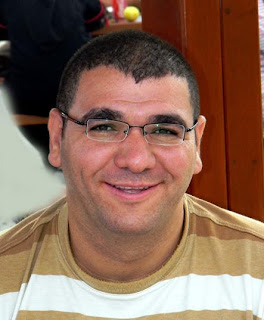After
ten years of homesickness in Australia. It is only now that I feel
estranged, remembering homes no longer inhabited by their residents in
those dark narrow alleyways, in that Palestinian refugee camp in Damascus called Yarmouk.
Whenever I used to visit them, I used to stomp my way over its rugged roads, choose carefully where to place my foot or my walking stick to avoid potholes (or water puddles in the winter). My hands would lean on the rough walls adorned by a picture of a martyr or by a slogan of the Palestinian uprising, or an old and badly-maintained car by the side of the road. Other, luckier, times, I would lean on the shoulder of one of my beloved relatives who were born a physical manifestation in the camp and grew up chained souls in Safad.
There, where ever I traveled to, I was rushing. For, every second I spend with them is another story or laugh, so why settle for less?
“Be careful of the irrigation pond, my son!” Grandma Um Sameer would warn me every time I would leave her house to go to my auntie Mariam’s, especially at night. May the blessings of Allah be on you, my dear. I still have the photo of me wearing my graduation attire to send to you, but you passed away two months before my graduation.
I don’t remember ever walking up 5 flights of stairs except when visiting my aunt Mariam. What’s strange is that most of all the apartments I used to visit her at were at least on the fourth floor. Yesterday I heard she left her home to go to Jermaneh in the Damascus countryside. I have not called her yet but I’m sure I’ll ask her if she had decided (by mistake) to live on the ground floor. I’m quite sure I would happily visit her even if she lived on the 10th floor.
When we miss our family and loved ones, we imagine them in a static image our memory perceives, in their rooms, wearing that specific shirt or thawb in that specific colour, smelling of yougurt cooked to make Shakiria (meat and yoghurt dish), our mind sees their dancing that needed no occasion. Our mind’s eye sees old newspaper clippings on the kitchen shelves. We see the ghee container that is now a vase.
And as long as they are still living in their homes, my homesickness remains a little bit less painful. Maybe because I know where to buy them sweets from on my way to visit them from the airport, or I would know what turn of the street my heart would start racing with excitement from.
But they all left, yesterday, none of that matters now. My breakfast on the next day of my arrival I will not be manakish from Abu Hasheesh Butchery. Instead here I sit on my chair, unable to even miss them properly.. this is the real estrangement, this is what it’s like to be in exile..
Whenever I used to visit them, I used to stomp my way over its rugged roads, choose carefully where to place my foot or my walking stick to avoid potholes (or water puddles in the winter). My hands would lean on the rough walls adorned by a picture of a martyr or by a slogan of the Palestinian uprising, or an old and badly-maintained car by the side of the road. Other, luckier, times, I would lean on the shoulder of one of my beloved relatives who were born a physical manifestation in the camp and grew up chained souls in Safad.
There, where ever I traveled to, I was rushing. For, every second I spend with them is another story or laugh, so why settle for less?
“Be careful of the irrigation pond, my son!” Grandma Um Sameer would warn me every time I would leave her house to go to my auntie Mariam’s, especially at night. May the blessings of Allah be on you, my dear. I still have the photo of me wearing my graduation attire to send to you, but you passed away two months before my graduation.
I don’t remember ever walking up 5 flights of stairs except when visiting my aunt Mariam. What’s strange is that most of all the apartments I used to visit her at were at least on the fourth floor. Yesterday I heard she left her home to go to Jermaneh in the Damascus countryside. I have not called her yet but I’m sure I’ll ask her if she had decided (by mistake) to live on the ground floor. I’m quite sure I would happily visit her even if she lived on the 10th floor.
When we miss our family and loved ones, we imagine them in a static image our memory perceives, in their rooms, wearing that specific shirt or thawb in that specific colour, smelling of yougurt cooked to make Shakiria (meat and yoghurt dish), our mind sees their dancing that needed no occasion. Our mind’s eye sees old newspaper clippings on the kitchen shelves. We see the ghee container that is now a vase.
And as long as they are still living in their homes, my homesickness remains a little bit less painful. Maybe because I know where to buy them sweets from on my way to visit them from the airport, or I would know what turn of the street my heart would start racing with excitement from.
But they all left, yesterday, none of that matters now. My breakfast on the next day of my arrival I will not be manakish from Abu Hasheesh Butchery. Instead here I sit on my chair, unable to even miss them properly.. this is the real estrangement, this is what it’s like to be in exile..







